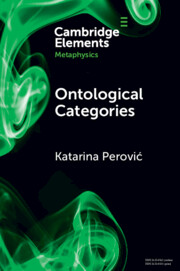Element contents
Ontological Categories
Published online by Cambridge University Press: 31 January 2024
Summary
Information
- Type
- Element
- Information
- Series: Elements in MetaphysicsOnline ISBN: 9781108973861Publisher: Cambridge University PressPrint publication: 29 February 2024
